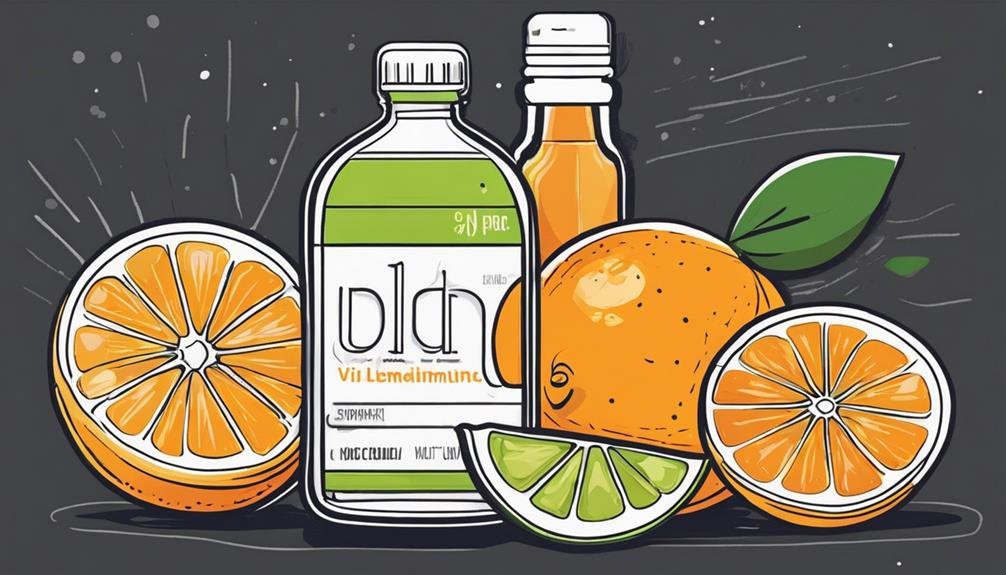As you navigate the journey of aging, nourishing your body with essential vitamin supplements can be as vital as a compass guiding a ship through turbulent waters.
Imagine the impact of incorporating seven key vitamins into your daily routine, each playing a unique role in supporting your overall health and well-being. From Vitamin D to Coenzyme Q10, these supplements hold the potential to enhance your vitality and quality of life as you age.
But what specific benefits do each of these vitamins offer, and how can they contribute to your healthy aging process?
Key Takeaways
- Vitamin D and calcium are crucial for bone strength and osteoporosis prevention.
- Omega-3 supports brain health and reduces cognitive decline risk.
- Magnesium improves heart health and circulation, lowering cardiovascular disease risk.
- Vitamin C boosts skin health, collagen production, and fights aging signs.
Vitamin D for Bone Health

To maintain strong bones and overall well-being, ensuring sufficient intake of Vitamin D is crucial as you age. Vitamin D plays a vital role in calcium absorption, which is essential for optimal bone strength and preventing conditions like osteoporosis. Adequate levels of Vitamin D aren't only important for bone health but also for supporting muscle function and a robust immune system. The recommended daily intake of Vitamin D is 600 IU before the age of 70 and 800 IU after to help maintain bone density and strength as you grow older.
As sunlight mightn't always be a reliable source of Vitamin D, especially with aging affecting your body's ability to produce it efficiently, incorporating Vitamin D-rich foods into your diet becomes crucial. Fatty fish, such as salmon, is an excellent source of Vitamin D that can help support your bone health and overall well-being. By ensuring you meet the recommended daily intake of Vitamin D, you're taking a proactive step towards maintaining strong bones, muscle function, and immune health as you age.
Omega-3 for Brain Function
Maintaining optimal brain function and cognitive health as you age is crucial, and one key component that plays a significant role is Omega-3 fatty acids. DHA, a type of omega-3, is vital as a major structural component of the brain, supporting its health and function. EPA, another omega-3 fatty acid, aids in overall brain health and mood regulation, contributing to cognitive well-being. Research suggests that Omega-3s can help reduce the risk of age-related cognitive decline and enhance memory retention.
Incorporating Omega-3 rich foods like fish into your diet or taking supplements can be beneficial for promoting healthy aging and supporting brain function. By ensuring an adequate intake of Omega-3 fatty acids, you're providing your brain with the necessary nutrients to thrive and potentially mitigate cognitive decline associated with aging. Prioritizing Omega-3 in your diet or through supplements is a proactive step towards maintaining cognitive health and overall well-being as you age.
Vitamin C for Skin Health

If you're looking to boost collagen production, fight free radicals, and enhance skin elasticity, Vitamin C is your go-to ally. Its potent antioxidant properties help shield your skin from environmental aggressors, promoting a more youthful and radiant complexion.
Incorporating Vitamin C into your skincare routine can help diminish wrinkles, brighten your skin, and even out skin tone.
Boosts Collagen Production
Boost your skin's health and elasticity by ensuring adequate intake of vitamin C, a crucial nutrient that boosts collagen production. Vitamin C plays a vital role in maintaining skin health and promoting collagen synthesis, essential for wound healing and skin regeneration.
Additionally, this antioxidant protects skin cells from damage caused by free radicals and UV exposure. By incorporating vitamin C-rich foods or supplements into your diet, you can support overall skin health and combat signs of aging such as wrinkles and fine lines.
- Vitamin C promotes collagen synthesis for skin regeneration.
- Acts as an antioxidant to protect skin cells from damage.
- Helps reduce signs of aging like wrinkles and fine lines.
Fights Free Radicals
To enhance your skin's defense against aging and damage, harness the potent antioxidant properties of Vitamin C. This vitamin acts as a shield, fighting off free radicals and promoting overall skin health.
By combatting free radicals, Vitamin C supports collagen production, enhancing skin elasticity and reducing the appearance of wrinkles. Additionally, Vitamin C helps in fading hyperpigmentation, evening out skin tone for a more youthful look.
Regular use of Vitamin C can improve skin texture, firmness, and overall radiance. Incorporating Vitamin C into your skincare routine not only fights free radicals but also boosts skin health, prevents UV damage, and supports natural skin regeneration processes.
Embrace Vitamin C for healthier, glowing skin.
Enhances Skin Elasticity
Enhancing skin elasticity is a key benefit of incorporating Vitamin C into your skincare routine. Vitamin C boosts collagen production, improving skin elasticity and reducing wrinkles. It acts as a powerful antioxidant, shielding your skin from damage caused by free radicals and UV exposure.
Additionally, Vitamin C brightens the skin tone, aiding in fading dark spots and pigmentation. Regular use of Vitamin C can enhance skin hydration and overall skin health, contributing to a youthful and radiant complexion. By integrating Vitamin C into your skincare routine, you're taking a proactive step towards maintaining healthy, resilient skin.
Calcium for Strong Bones

Calcium plays a vital role in maintaining strong bones and preventing osteoporosis, making it essential to prioritize sufficient intake, especially as you age. As you get older, your body's need for calcium increases to keep your bones healthy. Adequate calcium intake is crucial not only for bone strength but also for other bodily functions such as blood clotting and muscle contraction. Women over 50 and men over 70, in particular, should pay attention to meeting the recommended daily intake of 1,500mg of calcium to support their bone health.
Including calcium-rich foods like milk, yogurt, and cheese in your diet can help you meet your calcium needs. However, if you struggle to consume enough calcium through your diet, calcium supplements can be a practical solution. Prioritizing your calcium intake is a proactive step towards maintaining strong bones and overall health as you age.
Magnesium for Heart Health
Maintaining proper heart health requires adequate intake of magnesium, a crucial mineral that supports muscle function and regulates heart rhythm. Including magnesium-rich foods in your diet can significantly benefit your heart health. Here are some key points to consider:
- Lower Risk of Cardiovascular Diseases: Adequate magnesium intake has been linked to a reduced risk of heart attacks and high blood pressure, protecting you from cardiovascular diseases.
- Improved Circulation: Magnesium helps relax blood vessels, leading to lower blood pressure and enhanced circulation throughout your body, ultimately supporting your heart's function.
- Essential for Heart Health: Studies show that magnesium deficiency is associated with a higher risk of heart disease. Therefore, ensuring you meet your daily magnesium requirements is crucial for maintaining optimal cardiovascular health.
Vitamin B12 for Energy

Vitamin B12, an essential nutrient for energy production in your body, plays a crucial role in supporting overall vitality and cognitive function. This vitamin is vital for the formation of red blood cells, which transport oxygen to all tissues in your body, aiding in energy production.
However, deficiency in vitamin B12 can lead to symptoms like fatigue, weakness, and even neurological issues, affecting both your physical and cognitive well-being. Older adults are particularly at risk for vitamin B12 deficiency due to decreased absorption as they age.
Ensuring an adequate intake of vitamin B12 is crucial for maintaining optimal energy levels and cognitive function. By supporting oxygen transport through red blood cells, vitamin B12 helps combat fatigue and promotes overall vitality.
For older adults especially, incorporating sufficient vitamin B12 into your diet or through supplements can help prevent deficiencies that may lead to energy depletion and cognitive decline. Prioritizing this essential nutrient can contribute significantly to your overall health and well-being as you age.
Coenzyme Q10 for Cellular Health
Coenzyme Q10, or CoQ10, is a crucial antioxidant that supports cellular energy production. As you consider its benefits, recommended dosages, and potential side effects, keep in mind that maintaining adequate levels of CoQ10 is essential for overall cellular health.
Including Coenzyme Q10 in your supplement routine can help safeguard your cells, promote optimal function, and contribute to healthy aging.
Benefits of CoQ10
As we age, ensuring optimal cellular health and energy production becomes increasingly vital, making CoQ10 supplementation a valuable addition to support overall well-being. CoQ10, a potent antioxidant, is essential for cellular energy production and protecting against oxidative damage, particularly benefiting heart health. Here are three key benefits of CoQ10:
- Supports overall heart health
- Helps reduce oxidative stress in the body
- Enhances vitality and quality of life
Maintaining adequate CoQ10 levels is crucial for optimal cellular function and energy metabolism, especially as we age. Studies have shown that CoQ10 may improve symptoms of heart failure and contribute to a healthier aging process.
Dosage Recommendations
To ensure optimal cellular health and energy production as you age, it's recommended to consider a daily dosage of Coenzyme Q10 ranging from 100-200 mg. CoQ10 levels naturally decrease with age, making supplementation crucial for supporting cellular functions.
Research indicates that CoQ10 supplementation can enhance heart health, improve overall well-being, and act as a potent antioxidant, shielding cells from oxidative damage associated with aging. Consulting with a healthcare provider is advisable to determine the precise dosage of Coenzyme Q10 that aligns with individual health requirements.
Potential Side Effects
Considering the potential side effects of Coenzyme Q10 supplementation for cellular health, it's important to be aware of how your body may react to this nutrient.
- Some individuals may experience mild side effects like nausea, diarrhea, or abdominal discomfort.
- High doses of CoQ10 may interact with blood thinners, blood pressure medications, and chemotherapy drugs.
- Coenzyme Q10 may lower blood sugar levels, so individuals with diabetes should monitor their blood glucose closely.
It's crucial to consult a healthcare provider before starting CoQ10 supplementation, especially if you're taking medications for cardiovascular issues. While Coenzyme Q10 is generally well-tolerated, being informed about potential interactions and side effects can help you make the best choices for your health.
Frequently Asked Questions
Which Vitamin Is Essential for Anti-Aging?
For anti-aging, vitamin C is vital. It boosts skin health, acts as an antioxidant shield, aids collagen production, and bolsters immune support. Incorporate it to enhance skin radiance, combat free radicals, and boost overall health.
What Vitamins Should I Be Taking for My Age?
For your age, consider vitamin D, C, B, and E supplements based on individual needs. Discuss nutrient deficiencies with a healthcare provider to determine daily requirements. These vitamins can support skin health, cognitive function, bone strength, heart health, and immune support.
What Is the Best Anti-Aging Supplement?
For the best anti-aging supplement, consider Coenzyme Q10 as a top antioxidant boosting cellular health. It supports skin protection, collagen production for a youthful glow, and enhances energy levels. Prioritize brain function, immune support, joint and heart health.
What Are the 3 Most Important Vitamins?
When considering the 3 most important vitamins, focus on Vitamin D for bone health, mood, and immunity. Don't overlook Vitamin C's antioxidant power for skin and immunity, and remember Vitamin E's role in immune function.
Conclusion
As you journey through the seasons of life, remember that just like a garden needs sunlight and water to thrive, your body needs essential vitamins and supplements to support healthy aging.
Nourish yourself with Vitamin D, Omega-3, Vitamin C, Calcium, Magnesium, Vitamin B12, and Coenzyme Q10 to cultivate a strong foundation for vitality and wellness.
Embrace these nutrients like seeds of wisdom, planting them in the soil of your body to bloom with health and vitality in the years to come.
